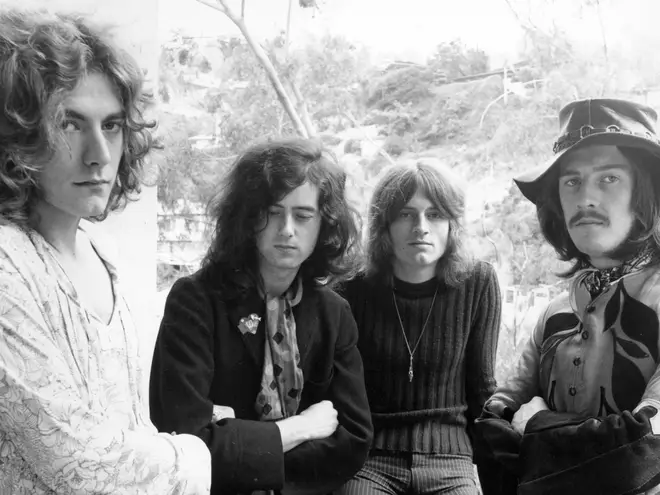The most famous musical plagiarism cases: from Led Zeppelin to Oasis
19 February 2023, 20:00

Over the years, many artists have been called into court to defend their songwriting from accusations of theft. Here are some of the most famous.
Listen to this article
Plagiarism happens in music, sometimes by accident, sometimes on purpose. Sometimes it's "unconscious borrowing", other times it's a "musical homage".
Here are a few of the most famous court cases and legal actions in music.
-
George Harrison Vs. The Chiffons

George Harrison - My Sweet Lord (Official Audio)
The ex-Beatle was the first of the Fab Four to have a massive hit in 1970 with My Sweet Lord, but he soon came a cropper when it was pointed out to him that it bore a strong resemblance to a 1962 hit by the US girl group The Chiffons, He's So Fine. Oops.

The Chiffons - He´s So Fine
A lengthy court case ensued, complicated by the fact that the former Beatles manager Allen Klein later ended up owning the publishing - effectively trying to sell the song back to our George. In September 1976, a judge declared the Beatle had “subconsciously” stolen the melody, but the financial details wouldn’t be settled until a couple of years before George’s death in 2001. John Lennon said of the affair: “Maybe he thought God would let him off.”
-
Led Zeppelin Vs. Spirit

Led Zeppelin - Stairway To Heaven (Official Audio)
Led Zep hit the headlines in 2016 after the intro to their 1971 hit, Stairway To Heaven, was accused of bearing a striking resemblance to US psych-rockers Spirit's 1968 instrumental, Taurus.

Spirit - Taurus
A judge decided that the songs - which both feature a descending chromatic four-chord progression - bore "no substantial similarity" to each other, saving Robert Plant and Jimmy Page a huge amount in royalties - with the Led Zep IV album selling over 23 MILLION copies in the US alone. An appeal was launched in 2018, but in March 2020, a court confirmed the original ruling: Page and Plant had not stolen the riff.
-
The New Seekers Vs. Oasis

Oasis - Shakermaker
Oasis made a huge splash in the summer of 1994 with their single Shakermaker, but it wasn't long before people pointed out that the opening line was VERY similar to the song I'd Like To Teach The World To Sing.

Coca-Cola, 1971 - 'Hilltop' | "I'd like to buy the world a Coke"
Originally written in 1971 for a Coke ad, it was later a huge hit for The New Seekers and the Gallaghers had to come to a settlement with the writers - some sources cite half a million dollars. Oasis legend has Noel now saying: "We prefer Pepsi".
-
Killing Joke Vs. Nirvana

Nirvana - Come As You Are
The Joke (as we don't call them) couldn't help noticing that the riff to their 1984 track Eighties was very similar to that off Nirvana's Come As You Are, which was included on their album Nevermind and later released as a single.

Killing Joke - Eighties
-
Wire Vs. Elastica

Connection // Elastica - ['Connection' Single]
Justine Frischmann's Britpop band always wore their post-punk influences on their sleeves, but in the case of their 1994 hit, the similarity to Wire's 1977 classic Three Girl Rhumba was too close for comfort.

Wire - Three Girl Rhumba
-
Lana Del Rey Vs Radiohead Vs Albert Hammond's Dad

Get Free
US singer Lana Del Rey became embroiled in a legal wrangle about alleged plagiarism, this time over her song Get Free, from her 2017 album Lust For Life. It's claimed that the track bears a resemblance to Radiohead's 1992 classic Creep. The dispute was settled in March 2018, with Del Rey announcing onstage: "Now that my lawsuit's over, I guess I can sing that song any time I want, right?"

Radiohead - Creep
It's all quite ironic, because Albert Hammond (father of Albert Hammond Jr of The Strokes, natch) penned a song The Air That I Breathe with Mike Hazelwood in 1972. Manchester band The Hollies took the song to No 2 in the UK charts in 1974, but the duo's publishers noted a similarity to Radiohead's Creep and they now get a songwriting credit.

The Hollies "The Air That I Breathe"
-
Robin Thicke And Pharrell Vs Marvin Gaye

Robin Thicke - Blurred Lines ft. T.I., Pharrell (Official Music Video)
Robin Thicke’s 2012 collaboration with Pharrell Wiliams and TI gained a lot of publicity with its video featuring topless supermodels, but the track itself gathered a bit of unwelcome attention when the family of Marvin Gaye claimed that the track sounded similar to the soul legend’s 1977 hit Got To Give It Up.

Got To Give lt Up - Marvin Gaye
The legal battle raged for two years, until a jury awarded damages of nearly £5 million. Thicke and Williams claimed that their track was only inspired by the “feel” of Gaye’s song, but to no avail. This caused worries among the songwriting industry as to what now constituted a composition - was it a chord progression, or a mere “vibe”? But copyright law remains actually the same as it was before the judgement, which must have caused a few sighs of relief around the world.
-
Joe Satriani Vs. Coldplay

Coldplay - Viva La Vida
Coldplay received two separate allegations of plagiarism for Viva La Vida; one from US band Creaky Boards (featuring a future Darwin Deez on guitar) and one from guitar legend Joe Satriani.

If I Could Fly
The former was quickly disproved (Coldplay had demos pre-dating those of Creaky Boards), but the latter was a different matter. "It felt like a dagger going through my heart," said Joe. After going to court, however, the judge dismissed the case "upon stipulation" and the matter was settled out of court.
-
The Rutles Vs. Oasis

Oasis - Whatever (Official Video)
The Gallaghers released their marvellous sing-a-long ditty as a one-off single at Christmas 1994. However, publishers EMI noticed a similarity between the main melody and that of the late Neil Innes' 1973 song How Sweet To Be An Idiot and wangled him a co-writing credit.

How Sweet To Be An Idiot
Often performing the track whenever Monty Python toured their live show, Innes was the songwriting genius behind Eric Idle's 1978 Beatles parody The Rutles. Oh, the irony.
-
John Lennon Vs Chuck Berry

The Beatles - Come Together
Lennon’s major contribution to The Beatles’ 1969 album Abbey Road was Come Together, which opened with the lyrics “Here come old flat-top, He come groovin’ up slowly.” Song publisher Morris Levy noticed that this and the song’s rhythm bore a similarity to his client Chuck Berry’s 1956 number You Can’t Catch Me.

Chuck Berry Performs "You Can't Catch Me" in 1956's "Rock, Rock, Rock!"
One of rock ’n’ roll’s pioneers, Berry’s song includes the line: “Here come a flat-top, he was movin' up with me”, so legal action was instigated. Lennon settled out of court by agreeing to record some of the songs that Levy published as a covers album, but the sessions collapsed and Lennon tried to back out of the deal. An angry Levy tried to release the tapes as an album on his own label, but Lennon’s record company Capitol intervened, suing Levy and issuing their own covers LP, Rock ’N’ Roll in 1975. Messy.









